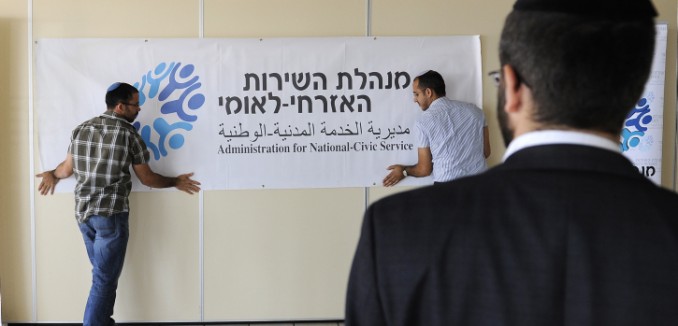An increasing number of Israeli Arabs are joining their country’s national service program, pursuing better professional opportunities while forging closer ties with Israeli society, The Times of Israel reported on Monday.
Israel’s national service program is an alternative to army service, and allows participants — typically observant Zionist Jewish women who opt out of army service for religious reasons — to volunteer for one or two years in the public sector.
While only 600 non-Jewish Israelis were enrolled in the program six years ago, today that number hovers at 4,500, reflecting a 650 percent increase. Of those, 70 percent are Muslim, with around 100 participants from eastern Jerusalem.
One young Muslim Arab participant, Bara’a Abed, was encouraged to join the national service by her husband, a Muslim Arab IDF combat veteran.
“At first I was afraid and thought the Arab community wouldn’t accept me. Then I thought to myself, what will I get from them? The state will give me what I need,” Abed told the Times of Israel. She requested that her face not be photographed by the Times due to safety concerns.
National service volunteers get the same benefits as soldiers: a monthly stipend around NIS 800 ($209), free healthcare and use of public transportation, and a grant given at the end of their program that can be used for higher education or purchasing a home. The state will also cover a full year of university studies for participants who served for two years.
The program also has a special perk for Arabic speakers, offering them a free year-long university preparation course that comes with a monthly stipend of NIS 1,500-3,700 ($393-$969).
Arab volunteers are deliberately placed in positions near their homes, allowing them to serve their own communities while retaining their living arrangements. Jewish volunteers, on the other hand, can be assigned to positions across the country.
Abed said the opportunity to participate in the program — giving back to society and receiving benefits in return — have strengthened her ties to the state. “I feel loyal to this state. I see what it provides to people in the community despite all the harsh words they say about the state,” she said.
Yet Abed still fears facing a backlash from her community for her decision to complete national service, which she has kept a secret. Sar Shalom Gerbi, general director of Israel’s national service, told the Times that Arab volunteers have been expelled from school, had their vehicles vandalized, and even been called “lepers” by an Arab member of Knesset due to their participation in the program.
Despite this, Gerbi said he has “no doubt” that the ranks of non-Jewish national service volunteers will continue to swell. He argued that the program was successful because it offered tangible benefits and did not force Arabs to serve, instead merely giving them the opportunity to do so. Eighty-five percent of participants find good jobs following their service, Gerbi said.
“They want to help their communities and they understand this can also be an entry card into Israeli society. It’s okay if they feel both,” he said.
“Today the youth are voting with their feet. Those who oppose national service can’t stop them,” Zienab Abu Swaid, the government’s coordinator for national service in the Arabic sector, told the Times. “For many people it’s not about the benefits, but about becoming more a part of Israeli society.”
In Towards a Zionism of Inclusion, which was published in the September 2014 issue of The Tower Magazine, Einat Wilf wrote that the “Palestinian national movement and Zionism appear so at odds that it is nearly impossible to conceive of a situation in which the Zionist narrative could be sufficiently rewritten to include Israeli Muslims.” Nonetheless, at the end of the essay, she held out hope:
It could perhaps become the story of how the Muslims, together with Jews, made the land of Israel whole again, bringing together all the religions that originated and flourished within its borders. It could be a story of return and reunification. A story of how the Muslims had to come to terms with being a minority and the Jews with being a majority before both could truly live as one, introducing the key element in any drama of return and reunification: The overcoming of obstacles.
It must be left to far better storytellers than myself to imagine what this narrative might look like. Right now, it requires the most fanciful imagination. But if Zionism has taught us anything, it is that reality begins with a dream.
[Photo: Zuzana Janku / Flash 90 ]




